Environmental Conservation
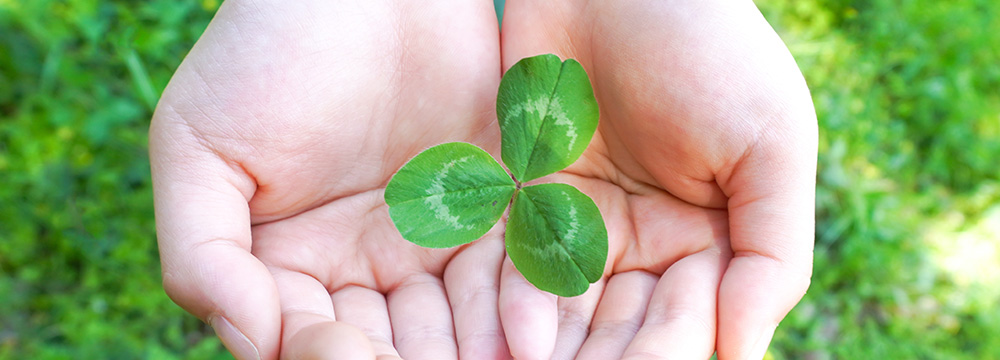
Environmental Philosophy
As a responsible corporate citizen, the Fujita Kanko Group strives to be friendly to the earth and our community, to do our best to reduce any negative effects our activities have on the environment, and to help build a sustainable society in which people will be safe and free to pursue rich and joyful lives.
Basic Policy
- Basic Policy
-
- 1. Promote reduction of CO2 emissions in business activities
-
-
We strive to preserve the forests and parks on our properties, and we are working toward CO2 reduction using methods such as cogeneration that utilizes waste heat.
-
- 2. Reduce waste and promote recycling of resources
-
-
As part of our contributions to a recycling-oriented society, we are conserving resources and using other methods such as recycling to reduce our waste output. We also make efforts to use resources in ways that are beneficial to the environment.
-
- 3. Contributions to biodiversity, local environment preservation, and the reduction of water usage
-
-
We recognize that water resources are essential to not only our business activities, but also to local communities' livelihoods, food production, and the preservation of biodiversity. We conserve water resources by using water-efficient shower heads and toilets in guest rooms, reclaimed water for toilet flushing, and various other efforts. In addition, by reducing our plastic usage and switching to products that are beneficial to the environment, we help contribute to biodiversity and local environment preservation.
-
- 4. Raise employees' awareness of the environment
-
-
We are increasing awareness of environmental issues through employee training and dedicated efforts at our business locations.
-
Initiatives
- Reducing CO2 emissions in business activities
-
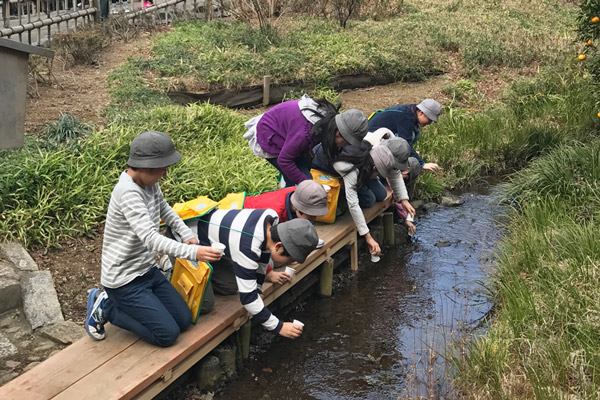
-
Preserving forests and gardens owned by the company
Fujita Kanko owns about 795 hectares of forests and gardens throughout Japan and contributes to the absorption of CO2 by preserving nature. In addition, Hotel Chinzanso Tokyo works to preserve the groundwater and trees in its garden, which it has taken care of for many years. Thanks to the hotel's effort, fireflies hover over the clear streams of the garden every summer, and the charming sight has become a seasonal tradition.
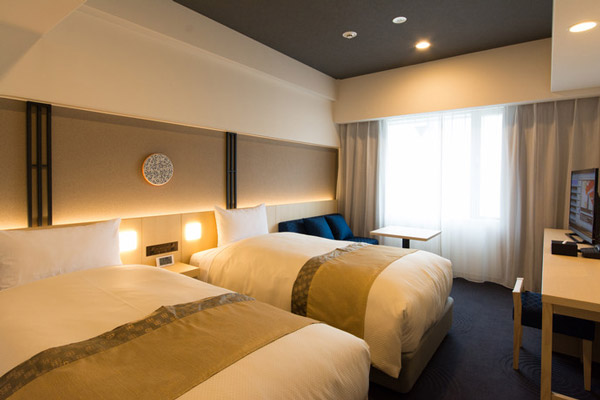
-
Ecological room cleaning (WHG Hotels, Hotel Chinzanso Tokyo, Hakone Kowakien)
With the understanding and cooperation of our guests, we provide eco-cleaning of guest rooms (simple cleaning that only consists of disposing of garbage, changing towels, and restocking amenities) for those who stay two or more nights. We work together with our customers to reduce CO2 emissions by reducing the amount of energy used during cleaning.
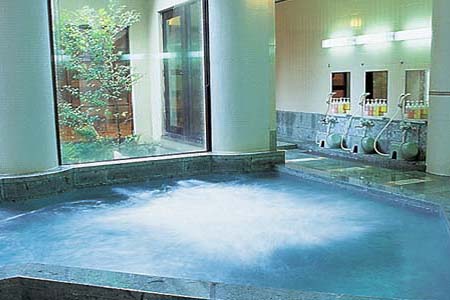
-
Using hot spring heat (Hakone Kowakien)
We have reduced the amount of fuel spent on heating boilers by using some of the water from the hot spring as a source for heat pump water heaters, exchanging heat with hot springs, and then using it to heat up the hot springs. Water from the heated hot springs and the hot springs used in the heat exchange are distributed to nearby hotels and apartments.
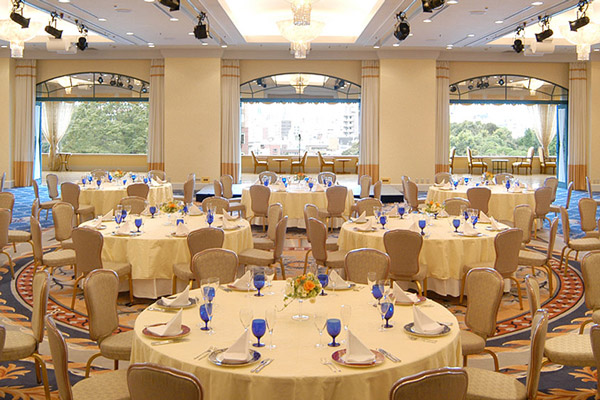
-
Installment of cogeneration systems (Hotel Chinzanso Tokyo, Hakone Kowakien, Hotel Gracery Kyoto Sanjo's South Building)
We have installed a cogeneration system that uses waste heat left over from generating power for heating, cooling, and hot water, thereby reducing CO2 emissions and ensuring that no energy goes to waste. It also provides a reliable reserve power supply for the sake of disaster prevention and safety loads in the event of an emergency such as an earthquake or fire. Because of that, we are prepared to respond to emergency situations according to our Business Continuity Plan (BCP).
- Reducing waste and promoting recycling of resources
-
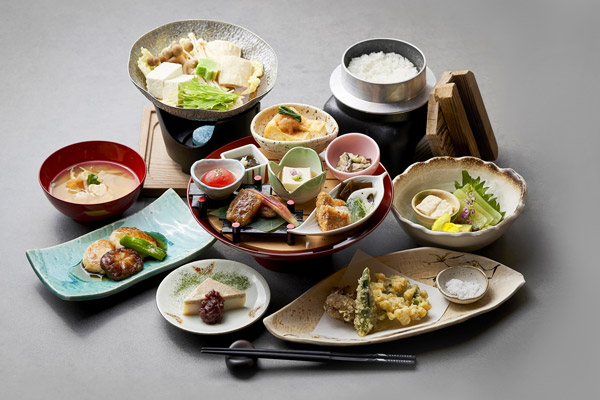
-
The spirit to use up the ingredients and let nothing go to waste (Hakujukan hotel of Eiheiji Temple)
Hakujukan, located in front of the gate to the Eiheiji Temple, follows a teaching by Tenzo Goroshi of Daihonzan Eiheiji Temple: "Bear in mind that we cook with the precious life of the ingredients, and use up that life without any waste." Putting that teaching into practice, we try to use up all of our ingredients in our cooking while wasting as little as possible. For example, we use vegetable scraps to make soup stock and take leftover trimmings of ingredients such as mushrooms, chop them up, and use them as ingredients for fried tofu fritters.
-
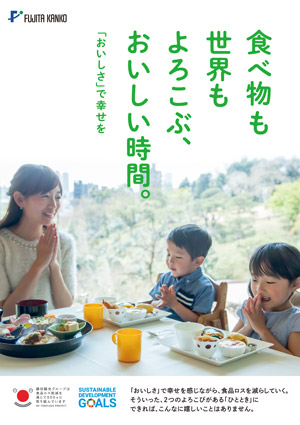
-
Efforts to reduce food waste
As a provider of meals at many establishments, we recognize reducing food waste as an important issue, and put up posters and promote the "3010 Movement" (which encourages party guests to enjoy food in the first 30 minutes and last 10 minutes of the party to reduce food waste) throughout the company. Some of our hotels sell leftover food from the breakfast buffet through the food sharing app TABETE to users who empathize with TABETE's goals and need that food.
-
Waste material recycling
Food recycling: Amounts recycled (Apr. to Mar. of following year for Fujita Kanko Inc.)
FY 2021: 159 metric tons
FY 2022: 213 metric tons
FY 2023: 242 metric tons
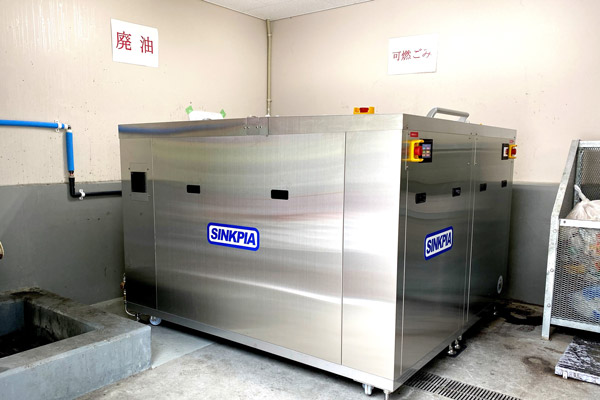
-
Use of biocompost (kitchen waste disposal) (Hakone Kowakien Ten-yu, Yunessun)
Instead of burning kitchen waste that is left over from kitchens and restaurants on a daily basis, we liquefy them using the power of biology. By setting up compost, we eliminate the CO2 emissions from transporting and burning the waste.

-
Collecting empty room amenity bottles (Hotel Chinzanso Tokyo)
In support of L'Occitane's Green Program,* Hotel Chinzanso Tokyo has begun collecting and recycling previously disposed amenity bottles ahead of all hotels nationwide.
* Green Program: A program that allows customers to return empty containers (plastic, glass, aluminum) for designated products at L'Occitane stores in exchange for points. Its tagline is "Let's recycle to do beautiful things for Earth."
- Conserving biodiversity and local environments
-
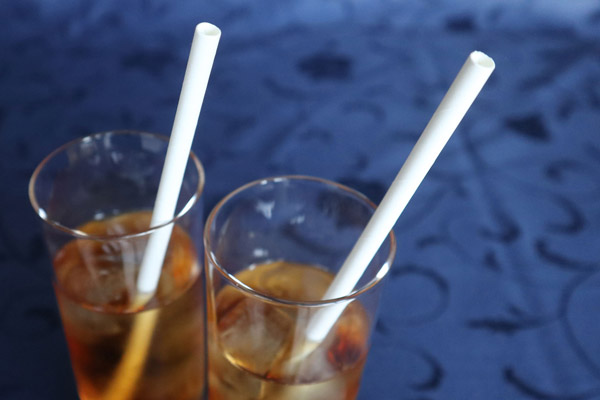
-
Reducing use of plastic products (company-wide)
In 2019, we reduced the number of plastic straws used in our hotels, restaurants, banquet halls, and other facilities by approximately 600,000 by switching to straws made of paper or biodegradable plastic.* We are making similar considerations for all hotel amenities.
* We can provide plastic straws with special shapes, such as bendable straws, at the guest's request.
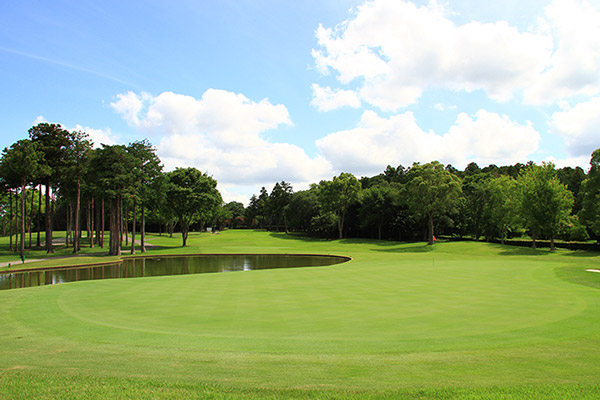
-
Conserving the environment and recycling resources at golf courses (Camellia Hills Country Club)
We convert some of the cut grass, leaves, branches, trees, and other debris from golf courses into compost instead of throwing them away. This way, we recycle resources and help grow grass and trees. We also scatter wood chips on sidewalks and woods in order to prevent mud from spreading in rough weather and make the courses move convenient for players to use.
* The golf courses are home to a variety of flora and fauna, and are part of our contributions to the conservation of the local environment.
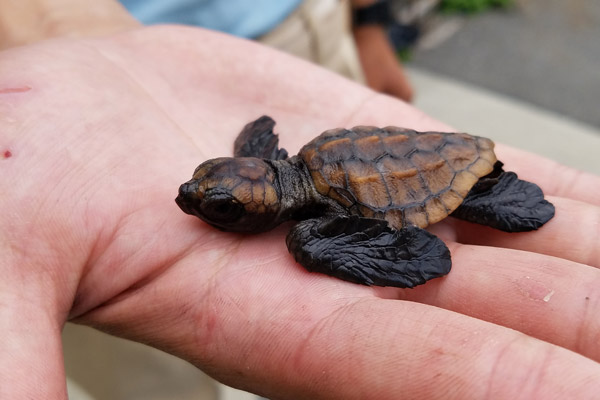
-
Nesting surveys of sea turtles (Shimoda Aquarium)
Since 1991, we have conducted surveys on the nesting habits of loggerhead sea turtles, the only one of its kind that nests in Honshu. Since 2014, when the loggerhead sea turtle was designated as an endangered species of wild fauna and flora in Shizuoka Prefecture, we have been commissioned by the prefectural government to conduct nesting surveys and activities to protect and monitor nesting sites. The nesting surveys are conducted as part of classes with local elementary schools and are part of our environmental education activities for local residents.

-
Offering Rainforest Alliance Certified coffee (WHG Hotels, Camellia Hills Country Club)
The Rainforest Alliance Certification is given to products that use raw materials supplied by farms that meet specific requirements on conserving forests and ecosystems, conserving soil and water, and improving work environments.
This coffee is available in guest rooms of WHG Hotels and the Camellia Hills Country Club's restaurant.
-
Maintaining efficient use of water resources
・Reduction of water usage through water-efficient equipment
・Reduction of water usage through reclaimed water
・Using well water to conserve water distribution energy
・Improving waste water treatment through measures such as septic systems
- Raising employees' awareness of SDGs
-
-
Promoting actions toward SDGs from the bottom up
In order to broaden our employees' understanding of sustainability, all of our establishments are promoting actions toward SDGs from the bottom up. Each establishment's initiatives are reported to the Sustainability Committee, and the president recognizes good efforts once a year.

-
Correspondence education for employees
As part of our employees' correspondence education, we offer several courses on SDGs and provide subsidies for the lecture fees. We will continue to improve our courses on sustainability while supporting our employees in understanding the correlation between business and the environment. We also aim to make use of the courses when providing services to our customers, communicating with business partners, and building relationships.
-
Disclosure based on TCFD
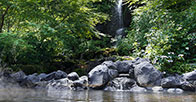
- Sustainability
- Policies and systems
- TCFD
- SDGs
Sustainability
- Top Message
- Environmental Conservation
- Customer Safety and Security
- Diversity and Inclusion
- Community and Society
- Compliance with Corporate Ethics
- Multi-Stakeholder Policy
Policies and systems
- Policies and systems
- Human Rights Policies
- Basic Policy toward Customer Harassment
- Procurement Policies・
Sustainable procurement
guidelines - Environmental Conservation
Basic Policy - Customer Safety and
Security Basic Policy - Diversity and Inclusion
(Respecting Human Rights)
Basic Policy / Diversity Policy - Community and Society
Basic Policy - Compliance with Corporate
Ethics Basic Policy
TCFD
- Compliance with TCFD
- Disclosure based on TCFD
- The World View Surrounding Our Group due to Climate Change
- Scenario Analysis
SDGs
- Home
- About